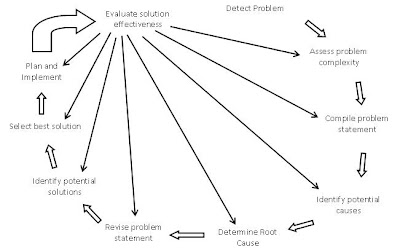Sustainable organisations are necessarily learning organisations, and formal problem solving represents a wonderful means for employees to share ideas, transfer knowledge and learn, all while boosting performance. The idea that one can develop a sustainability strategy, implement it and then become sustainable is simply not true. In the real world change is everywhere, and it is the quality of an organisation’s response to this change that determines its rate of progress along the sustainability continuum. The link between problem solving and change is made explicit through the definition of clear measurable goals that support an organisation’s sustainability strategy. Both the strategy and the goals will change over time, the latter more often than the former, since goals are of a shorter-term nature and are defined by tactics. Each goal should have measurable targets, and problems can then be framed based on the gap between these targets and actual performance. A critical point here is that the size of the gap is not a measure of whether problem solving is required or not, since the same fundamental approach applies. Problem solving is not just for organisations in crisis, but is a fundamental tool of even the most high-performance organisation.
To give you some insight into what formal problem solving entails, below is the process I use to structure problem solving exercises in client organisations. The process is generic and can apply to any problem in an organisation, whether this be in energy conservation, pollution prevention, human resources, business process optimisation – it really does not matter.
The principle of using problem solving for performance improvement is simple. If you can detect and solve problems rapidly (and by "solving problems” I mean you have prevented individual problems from recurring by removing their root causes), soon you will reduce the number of obstacles to performance to such a degree that superior performance becomes inevitable. Poor performance means that, by definition, you have problems to solve. You can find out more about the individual steps in the problem solving process in this post. I recently started a blog dedicated to problem solving, which you can find here if you are interested.


No comments:
Post a Comment